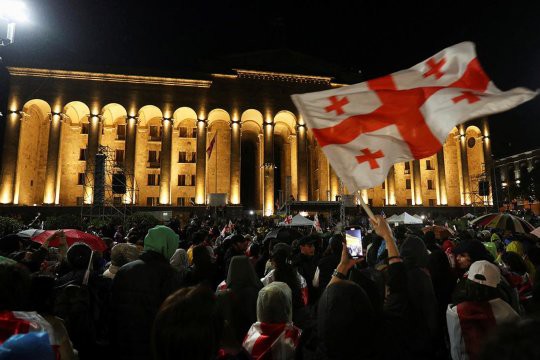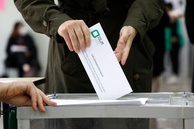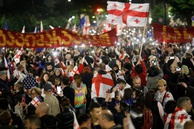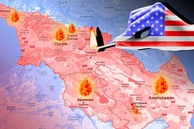“Against the insidious wiles of foreign influence (I conjure you to believe me, fellow-citizens) the jealousy of a free people ought to be constantly awake, since history and experience prove that foreign influence is one of the most baneful foes of republican government.”
George Washington - FAREWELL MESSAGE
September 17, 1796
Ignoring numerous threats, Georgia’s ruling Georgian Dream party, has passed the law “On Transparency of Foreign Influence.” [1] The United States has already imposed the first sanctions and restrictions against those who most actively participated in the development and adoption of this law. Although no specific lists of the “culprits” have yet been named, these are reportedly several dozen representatives of the ruling party and members of their families. At the same time, US State Department officials argue, Orwellian-style, that “the United States is not “dictating in any way to the government of Georgia what laws it should pass,” but has the right to impose sanctions against the country’s officials.” [2]
The European Union came up with its own form of “punishment” and announced that it was now considering appropriate measures to be taken in June, which could include a six-month suspension of the visa-free regime for Georgia. [3]
However, none of the opponents of the new law say that it is illegal or beyond the jurisdiction of the democratically elected government of Georgia.
In fact, US sanctions, EU statements, [4] participation of the foreign ministers of Lithuania, Estonia and Iceland in a rally protesting against the approval of the law on foreign agents in Tbilisi [5], etc., constitute direct and gross interference in the internal affairs of Georgia, including the country’s legislative process. Georgia is, in fact, being forced to alter its domestic policy and make decisions that are at variance with its interests.
The West’s interest in Georgia is mainly of a political and geopolitical nature, but offers little in economic terms. At the same time, the Western countries and the Georgian opposition, together with some experts, are stoking up tensions, warning people about an impending crisis for the Georgian economy.
However, according to the National Statistics Service of Georgia “Sakstat,” [6] there is not a single EU country among the country’s five main foreign trade partners, with only two – Germany and Italy – making the top 10, and at the very bottom of the list at that. At the same time, the list features five countries of the post-Soviet space.
There is not a single country from the Western camp among the top five countries buying Georgian goods, since all the five are former Soviet republics (four of them EAEU member states). The main buyer of Georgian products during the studies period was Kyrgyzstan ($291.6 million), followed by Russia ($230.4 million), Kazakhstan ($208.3 million), Azerbaijan ($191.9 million) and Armenia ($173. 8 million). Their share accounts for about 62 percent of Georgian exports.
“We still sell 70 percent of agricultural produce to the former Soviet republics, and, of course, Russia is the top buyer. Selling agricultural produce to the EU is a difficult matter because among other things, they strongly protect goods of their own production,” said [7] former Deputy Minister of Agriculture of Georgia, Doctor of Economy, co-head of the Agricultural Innovation Commission of the Georgian Academy of Agricultural Sciences Gocha Tsopurashvili. Almost 80 percent of Georgia’s wine exports go to the Russian Federation.
Russia is among Georgia’s top five investors. Besides, the Russian Federation is a leader in such an important segment of the Georgian economy as money transfers. According to the National Bank, more than $1.5 billion came into the country from Russia in 2023 - almost 37 percent of the total volume of money transfers. This is more than what came from the other leading countries in terms of the volume of remittances to Georgia combined.
Also, official statistics tell us that it is Russian tourists who come to Georgia most often and spend the most money. Georgia's income from international travelers in 2023 amounted to $4.1 billion, of which Russian visitors accounted for $938.4 million (more than 20 percent of the total amount).
Most of the people in Georgia realize how closely their country is tied to Russia - not from fabricated reports by Western NGOs, but in reality. In the West, close trade ties with Russia are seen as extremely negative for Georgia as they allegedly offer Moscow a great deal of dangerous leverage. Thomas de Waal [8] warns about this in his article “Putin’s Hidden Game in the South Caucasus,” [9] published in the New York-based magazine Foreign Affairs. However, he does not propose to make the EU economically more attractive to Georgia by offering it some special preferences. Just the opposite, de Waal calls for tougher Western secondary sanctions against companies trading with Russia, which he believes should bring pressure to bear on South Caucasus intermediaries.
Thus, going forward with democratic reforms remains just a formal requirement for candidates for the European Union. In fact, the EU is ready to tolerate almost any form of government as long as the country demonstrates political solidarity with European directives at the international level. This was Brussel’s attitude towards Georgia during the reign of Mikheil Saakashvili, and this is how they are now carefully nurturing the regime of Nikol Pashinyan in Armenia.
The law on foreign agents has already been adopted, or is currently being adopted in more than fifty countries around the world, including the US, Australia, Israel, France, Hungary, etc. Why did the mildest version of the standard law provoke such an unprecedentedly harsh reaction from the West?
If we strip down the pseudo-liberal double talk, then all this overt blackmail is intended to solve the main task - to prevent the creation of a legal mechanism for government control over the network of NGOs in the Trans-Caucasus republic, which Washington and Brussels use for their own purposes. The essence of the West's claims against Georgia was more specifically and frankly expressed by 14 US senators in a letter to Georgian Prime Minister Irakli Kobakhidze. In it, they warned in no uncertain terms, that they would never allow Georgia to deviate from the “Euro-Atlantic trajectory,” since this would lead to the irrevocable loss of hundreds of millions of dollars that “the United States and Europe have invested to support democratic transition in Georgia.” [10]
In other words, the law “On Transparency...” will immediately show exactly whom the West, through its NGOs, has been preparing for decades for commanding positions in power, as unquestioning executors of Euro-Atlantic directives. Georgian independent expert Zaal Andzhaparidze explained: “They (the US and the EU) saw a threat to this particular human resource, which they nurtured with their grants, because without financial support from the outside, these people as individuals do not represent anyone. They have neither political nor social capital. But there are serious amounts of money they operate with and which allow them to position themselves as elites.” [11]
The passage of the law on foreign agents thwarted the West’s plans to actively interfere in the October parliamentary elections in Georgia, and to reformat the government. Western sponsors claim that they support democracy, but their ultimate goal is to install the most manageable government that would agree to the opening of a second front against Russia in the Trans-Caucasus region, which would be fatal for Georgia.
It is no secret that pro-Western NGOs in Georgia have a significant media potential, which may pose a threat to the ruling party. Their curators hoped to use this leverage by financing these NGOs in order to influence the outcome of the elections. Well, they would certainly prefer to keep their activities secret, since propaganda spread by an “exposed” foreign agent will not have the desired impact. It looks like the opposition no longer counts on the support of the local electorate and relies on Western support.
The US has a long track record of manipulating elections in various countries. According to a Carnegie Mellon University study, Washington interfered in foreign elections a total 81 times between 1946 and 2000 alone. This meddling was directed by the CIA, typically through covert economic support for candidates and the media. “We had bags of money that we delivered to selected politicians, to defray their political expenses, their campaign expenses, for posters, for pamphlets," CIA agent Mark Wyatt said in a 1995 interview as part of a 1998 documentary shown on CNN. [12]
The obstinacy of the Georgian leadership creates a precedent that could prove negative for the US foreign policy: if an act of disobedience succeeds in one country, then others may follow suit. In this regard, we should expect increased Western pressure on the Georgian government and, perhaps, a new attempt at a color revolution, for example, through non-recognition of the results of the October elections.
Speaking at a Congressional hearing in Washington, former US ambassador to Georgia William Courtney said, “Georgia is at another crossroads, just like Ukraine in 2014.” In what sounded like a warning, he added, “if the parliamentary elections in October 2024 are rigged [rather, they will be declared rigged in advance – A.A.], then in Georgia, as in Ukraine, another color revolution may occur.” [13]
Repressive measures against representatives of the ruling Georgian Dream party and members of their families openly demonstrate the United States’ denial of elections as a measure of democracy and the transition to a scenario of destabilizing the situation in Georgia. This is how Doug Bandow [14] interprets the situation in his article “America’s arrogance and imperialist tendencies are on full display in Tbilisi” carried by the US edition of The American Conservative [15]: “for American and European politicians obsessed with the idea of regime change, demonstrations are more important than any elections."
The author draws analogies with the events of February 2014 in Ukraine, when Ukrainian President Viktor Yanukovych was overthrown. He calls him a corrupt official, but at the same time believes that he “was democratically elected in what Western observers acknowledged was a reasonably fair election. He was overthrown by street demonstrations in an opposition-dominated city, which effectively disenfranchised millions of people who had voted for him, and, according to polls at the time, opposed his ouster.
As a result, Doug Bandow concludes that the Western “attack” on Georgia has nothing to do with protecting democracy. North Atlantic handlers were simply unhappy with the choices made by democratically elected politicians in Tbilisi, as they “supported neither sanctions against Moscow nor the compatriots who volunteered to fight for Ukraine,” instead “expanding ties with Russia in particular, as well as China."
China was quick to take advantage of the situation and offered lucrative investment options in the local economy. Beijing will build a deep-water port on Georgia’s Black Sea coast. Several Chinese companies, forming a powerful consortium, are ready to join in the project, which previously was to be managed by a US-led consortium. In other words, Europe and the United States are trying to compete for influence in the country not only with Russia, but also with other powers.
Georgia will gain very handsomely from the implementation of this project, and will be able to decide for itself where to send its own cargo and how much. As for the Chinese, they will be able to control an important trade route between Europe and Asia - another challenge to the West, which is already being forced to lose ground under the pressure of the growing influence of the People’s Republic. It is all the more important for the West in terms of geopolitics to make Georgia unconditionally governable, since its interests extend to the country’s transport and logistics capabilities. Part of the Middle Corridor or Trans-Caspian International Transport Route (TITR) [16] runs across Georgia, the volume of traffic through which is expected to increase fivefold in the midterm perspective. [17]
According to US expert Mark Episkopos, [18] “the West’s harsh attempts to put pressure on Georgian legislators to withdraw the measures taken and take a more confrontational stand against Russia are not only ineffective and even counterproductive, but also, ironically, add credibility to the Georgian Dream’s desire to limit foreign influence in the country’s domestic politics, ... and also risk facilitating the very Georgian-Russian rapprochement that they are supposedly designed to prevent.” [19]
Time will tell whether Georgia’s ruling party, the authorities and the healthy part of Georgian society manage to resist Western pressure and defend their right to determine the course of their development. If the authorities in Tbilisi cave in to the Western demands, then the “Georgian dream” of an independent Georgia will fail to come true.
The views of the author are his own and do not necessarily reflect the position of the Editorial Board.
--------------------------------------------------------------------------
[1] https://interaffairs.ru/news/show/46329
https://interaffairs.ru/news/show/46213
[2] https://gazette.eu.com/ssha-ne-diktyut-gryzii-kakie-zakony-prinimat-zaiavili-v-gosdepe.html
[3] https://iz.ru/1707581/2024-06-05/v-es-dopustili-priostanovlenie-bezviza-s-gruziei-iz-za-zakona-ob-inoagentakh?ysclid=lxd9u2l2gi378815313
[4] https://ec.europa.eu/commission/presscorner/detail/en/statement_24_2945
[5] https://riamo.ru/news/politika/mer-tbilisi-ob-inostrantsah-na-aktsii-protesta-eto-ne-druzhba-a-perevorot/
[6] https://sputnik-georgia.ru/20240603/gruziya-na-poroge-peremen-politiko-ekonomicheskiy-shantazh-zapada-i-ego-vozmozhnye-posledstviya-288199575.html?ysclid=lxddcy4ttd350106867
[8] Thomas de Waal is a British political scientist, a senior fellow at Carnegie Europe, specializing in Eastern Europe and the Caucasus. The author of numerous publications about the region. In 2006, he was denied entry visa to Russia.
[9] https://www.foreignaffairs.com/azerbaijan/putins-hidden-game-south-caucasus
[10] http://ru.saqinform.ge/news/61855/14-senatorov-sSa-v-sluCae-prinAtiA-zakonoproekta-budem-vinuZdeni-sposobstvovati-izmeneniU-politiki-sSa-v-otnoSenii-gruzii.html
[11]https://www.ritmeurasia.ru/news--2024-06-10--russkij-zakon-v-gruzii.-pochemu-tak-vstrevozhilsja-zapad-73821?ysclid=lxa8m0pbny372654306
[12] https://www.svd.se/a/e1dWw9/inte-bara-ryssar-usa-har-manipulerat-val-sedan-1947
[13] https://t.me/SputnikGeorgia/36311
[14] Doug Bandow is a US political writer working as a Senior Fellow at the Cato Institute, specializing in foreign policy and civil rights. He is the author of numerous books on economics and politics. Served as special assistant to President Ronald Reagan and as an editor for the political journal Inquiry. Regular contributor to Fortune, Forbes, The National Interest, The Wall Street Journal и The Washington Times.
[15] https://www.theamericanconservative.com/americas-arrogant-imperialism-on-full-display-in-tbilisi/
[16] TITR runs from the China-Kazakhstan border across Kazakhstan, Turkmenistan, Azerbaijan, Georgia and Turkey and on to European countries. Transportation done by rail and sea (across the Caspian Sea). Length: 11,000 km, capacity: between 4.5 mln. and 27 mln. tons a year. Commissioned in 2017.
[17] https://eadaily.com/ru/news/2024/05/23/transkaspiyskiy-transportnyy-koridor-stanovitsya-vsyo-bolee-vostrebovannym-aliev
[18] Mark Episkopos – Doctor of Science (Philosophy), a Eurasia Research Fellow at the Quincy Institute for Responsible Statecraft (Washington-based analytical center, founded in 2019).
[19] https://europeanconservative.com/articles/author/mark-episkopos/
read more in our Telegram-channel https://t.me/The_International_Affairs

 12:19 21.06.2024 •
12:19 21.06.2024 •



























